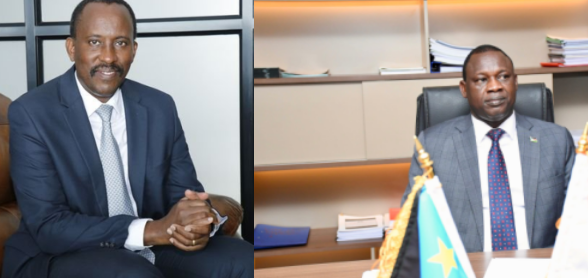A very well calculated scheme by a section of South Sudanese individuals to orchestrate trade protocols across the border with Uganda has left many stakeholders in utter shock about the management of public revenue and regional economic integration.
This calls for the intervention of the two governments to investigate why some officials from South Sudan Revenue Authority are usurping powers of the relevant ministries to push for measures that may result in non-tariff barriers. This has not only sparked off debate about the compliance with regional trade protocols but it has inculcated fears on the motives by these individuals. It would be prudent enough for the respective finance ministries to intervene, restore order at the border before the situation gets out of hand.
Following the letter dated November 21, 2025 and referenced RSS/SSRA/J/CG/OUT/2025/547, the SSRA CG notifies the URA Commissioner General about the unscheduled urgent meeting regarding the implementation and enforcement of the E-Permit system between the two administrations.
However, the URA Commissioner General has taken a lead in protecting both Ugandan and Sudanese traders by swiftly suspending the E=Permit enforcement for the destined goods to South Sudan due to predicted and detected adverse effects of the system.
Following the controversy, there is already suspicion, delays, and rising business costs that have continued to cast a long shadow over cross-border trade, fueling fears that private enrichment is taking precedence over public revenue and regional integration.
It should be noted that SSRA introduced the use of electronic import permits, a system they argue has been interpreted by some Ugandan enforcement teams as mandatory for goods entering South Sudan through Uganda whereas not.
Stakeholders claim that this has led to instances in which officials on the Ugandan side began enforcing requirements that are not yet harmonized under regional frameworks.
Business associations, traders and transporters contend that such actions could contradict regional trade agreements governing the free movement of goods and persons, including protocols under the East African Community (EAC) and related bilateral trade arrangements. They warn that additional layers of documentation may create delays, raise transport costs, and disrupt supply chains vital to both economies.
“We are concerned that these new procedures, which appear to be outside the agreed regional frameworks, are slowing down trade and causing uncertainty for businesses,” said one of the concerned traders. “We need clarity from both governments.”
Persistent confusion at the Uganda–South Sudan border points has intensified after traders, transporters, and civil society monitors alleged that a private company, working in connection with officials in South Sudan, is behind a controversial electronic import-permit system that many believe is driving unofficial fees and double taxation on goods bound for Juba.
According to multiple trader associations, the electronic import permit system appears to have been initiated through a private company whose role has not been publicly clarified. Transporters report that they are often told they cannot proceed without purchasing these electronic permits, even when they have already paid customs duties at designated points.
The way this system is designed, there are fears of double taxation as well as revenue leakage. Economic analysts monitoring the situation warn that if the allegations are verified, the scheme could be siphoning significant revenue away from official South Sudan government channels, leaving both traders and the state short-changed.
The innocent traders are subjected to paying normal customs duties, border processing fees and additional charges linked to the electronic permit system. This is unfair because the receipts issued allegedly lack clear government coding and this may lead to funds being diverted to private accounts rather than the national treasury.
A regional trade expert said “South Sudan’s economy is fragile, any unmonitored extractions, legal or otherwise, directly undermine public revenue and distort the cost of goods in the market.”
On the Ugandan side, enforcement officers appear to be acting on what traders describe as ambiguous directives. This has created a scenario in which Uganda may inadvertently be enforcing requirements not recognized under regional law, potentially placing the country in conflict with EAC commitments.
Prominent traders contend that neither the EAC nor bilateral Uganda–South Sudan agreements provide for electronic import permits issued through private intermediaries.
The confusion has also strained the crucial Elegu–Nimule corridor through which a significant share of South Sudan’s essential imports pass. The transport delays and informal fees are already contributing to higher commodity prices in Juba and surrounding counties.
CALLS FOR POLICY CLARITY
Civil society groups, chambers of commerce, and logistics unions are now demanding a formal investigation into: the legal authority behind the electronic permit scheme, the identity and mandate of the private company involved, the transparency and accounting of fees collected and Uganda’s basis for enforcing a system not formally recognized regionally.


